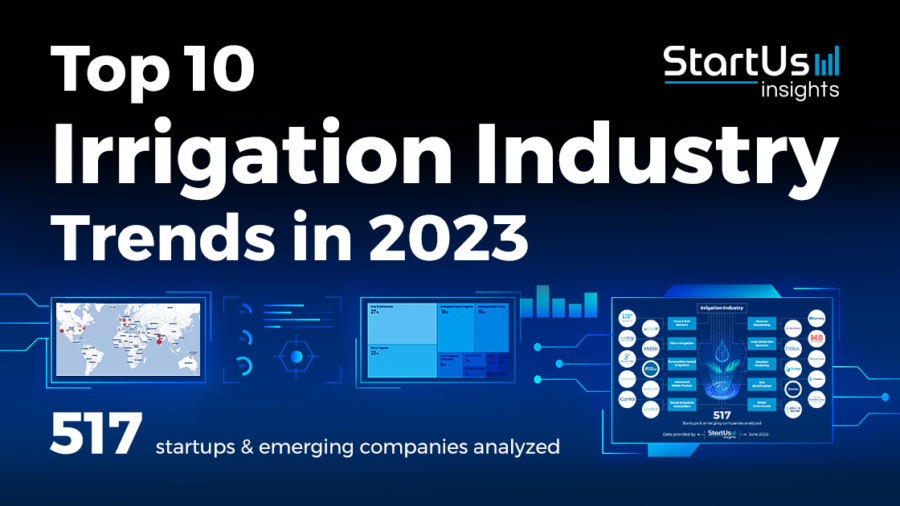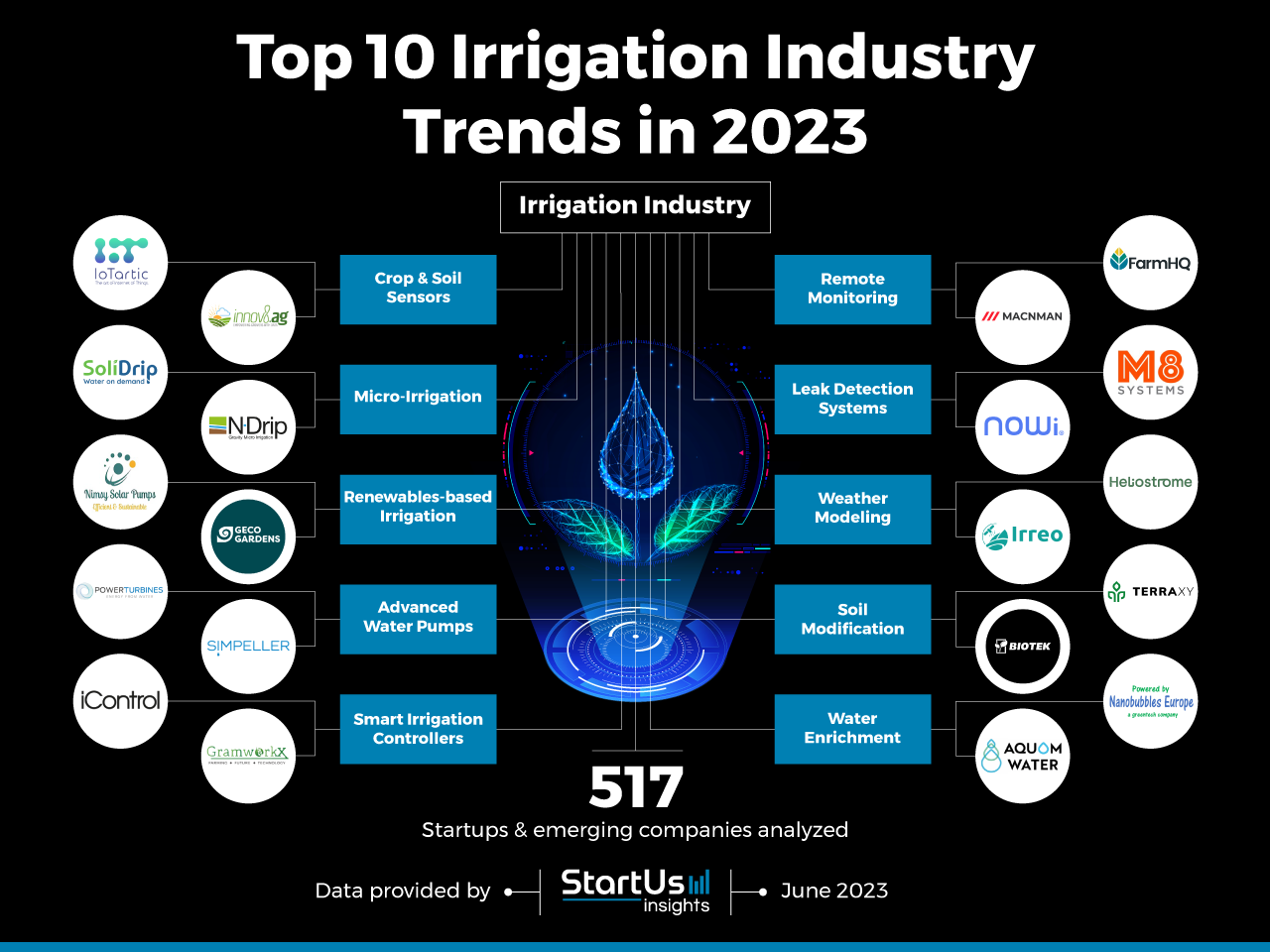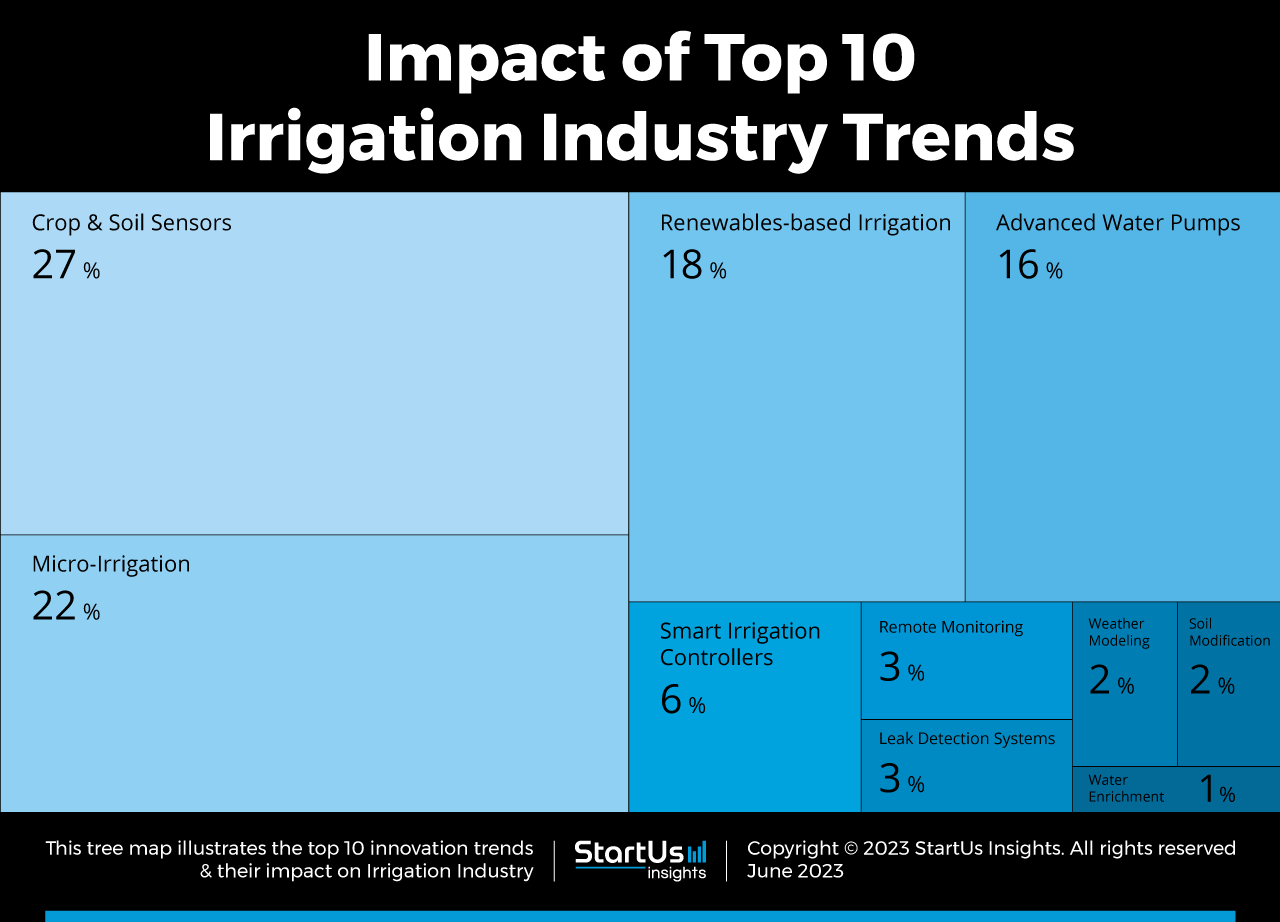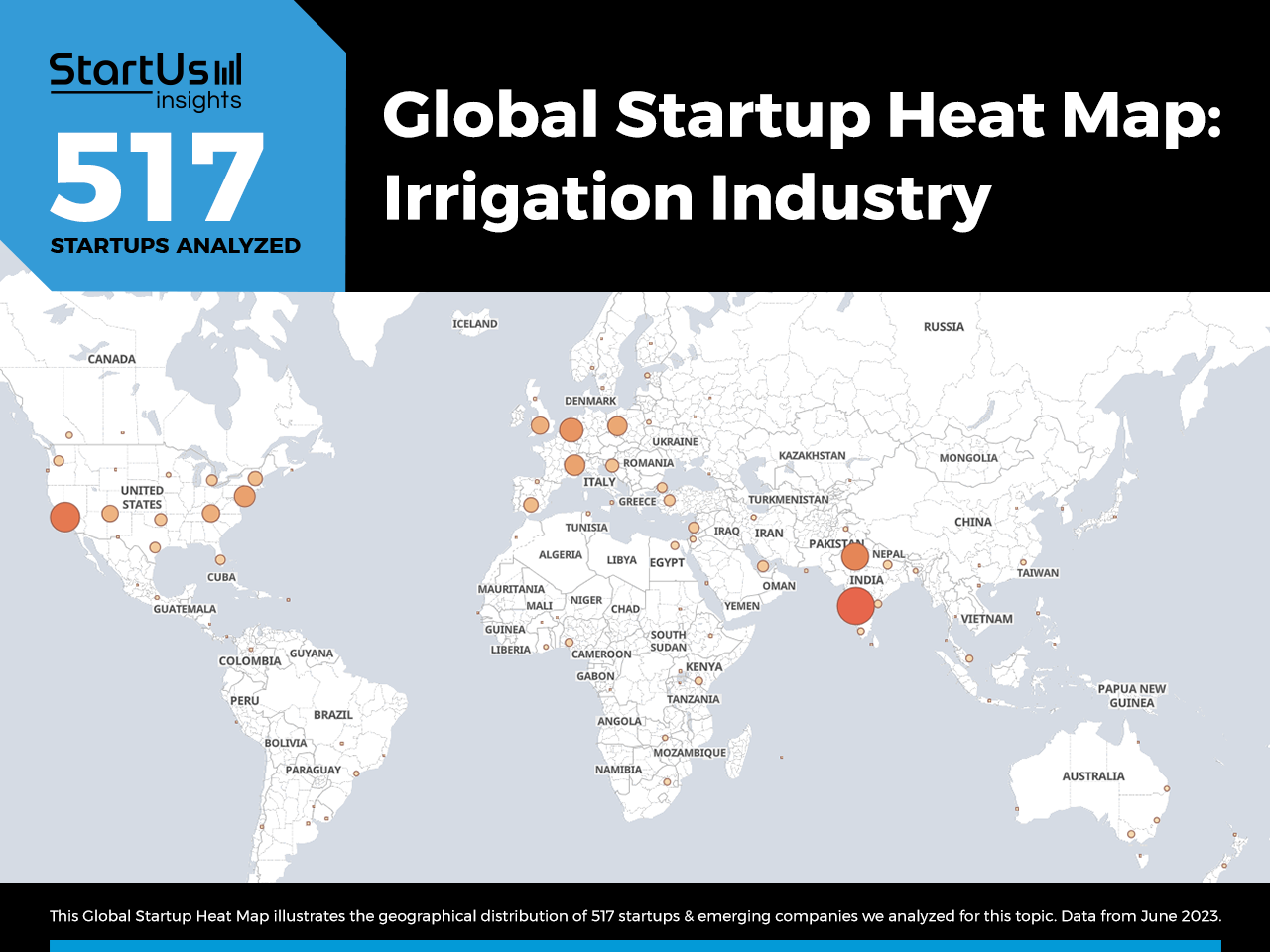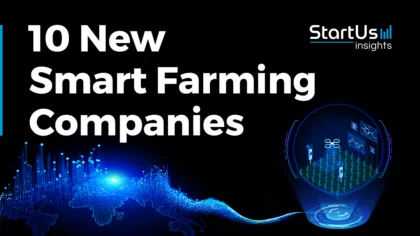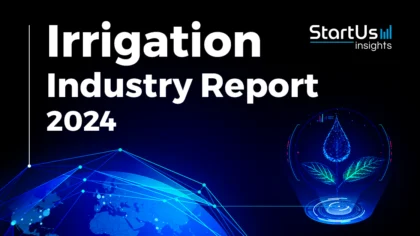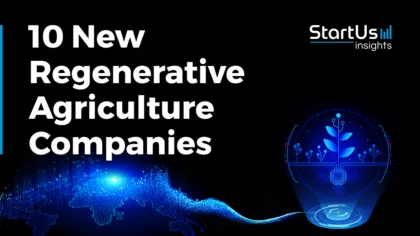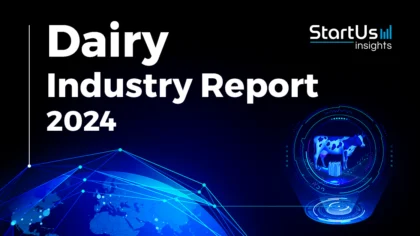Traditional irrigation practices face several challenges from inefficient water usage and overwatering to inadequate distribution systems. This results in water wastage, increased costs, and environmental concerns. Technological innovations address these challenges through precision and micro irrigation systems, soil sensors, and more. This industry research focuses on the top 10 irrigation industry trends in 2024 based on our analysis of 500+ emerging technology companies. These trends include renewables-based irrigation, smart irrigation controllers, remote monitoring, and more. Read more to explore each trend in detail and how they optimize water consumption.
Innovation Map outlines the Top 10 Irrigation Industry Trends & 20 Promising Startups
For this in-depth research on the Top Irrigation Industry Trends & Startups, we analyzed a sample of 517 global startups & scaleups. This data-driven research provides innovation intelligence that helps you improve strategic decision-making by giving you an overview of emerging technologies in the irrigation and agriculture industry. In the Irrigation Industry Innovation Map below, you get a comprehensive overview of the innovation trends & startups that impact your company.
These insights are derived by working with our Big Data & Artificial Intelligence-powered StartUs Insights Discovery Platform, covering 3 790 000+ startups & scaleups globally. As the world’s largest resource for data on emerging companies, the SaaS platform enables you to identify relevant technologies and industry trends quickly & exhaustively.
Tree Map reveals the Impact of the Top 10 Trends in the Irrigation Industry
Based on the Irrigation Industry Innovation Map, the Tree Map below illustrates the impact of the Top 10 Irrigation Industry Trends in 2024. Crop and soil sensors enable precise monitoring of moisture levels and nutrient content to optimize irrigation strategies. Micro-irrigation techniques deliver water directly to the plant roots, reducing water wastage and enhancing efficiency. Additionally, renewables-based irrigation systems harness solar or wind energy to power pumps and irrigation processes, promoting sustainability. Advanced water pumps enhance water distribution by reducing energy and water consumption. Smart irrigation controllers further utilize data from sensors and weather modeling to automate irrigation schedules, ensuring optimal water usage. Further, remote monitoring and leak detection systems enable real-time monitoring and rapid response to water leaks. Lastly, soil modification techniques enhance soil quality and water retention capacity while water enrichment technologies improve water quality for irrigation purposes.
Top 10 Trends in Irrigation (2024)
- Crop & Soil Sensors
- Micro-Irrigation
- Renewables-based Irrigation
- Advanced Water Pumps
- Smart Irrigation Controllers
- Remote Monitoring
- Leak Detection Systems
- Weather Modeling
- Soil Modification
- Water Enrichment
Global Startup Heat Map covers 517 Irrigation Technology Startups & Scaleups
The Global Startup Heat Map below highlights the global distribution of the 517 exemplary startups & scaleups that we analyzed for this research. Created through the StartUs Insights Discovery Platform, the Heat Map reveals high startup activity in India, followed by Western Europe and the US. Below, you get to meet 20 out of these 517 promising startups & scaleups as well as the solutions they develop. These emerging irrigation technology companies are hand-picked based on criteria such as founding year, location, funding raised & more. Depending on your specific needs, your top picks might look entirely different.
Top 10 Future Trends in Irrigation
1. Crop & Soil Sensors
Inefficient water use through over or under-irrigation leads to unnecessary resource wastage and crop stress. To tackle this, crop and soil sensors provide real-time data on soil moisture levels, crop water requirements, and other environmental conditions. These sensors use advanced sensing technologies like capacitance sensors, tensiometers, or spectral analysis. This enables precise monitoring of soil moisture content, temperature, and nutrient levels. Such Internet of Things (IoT)-sourced data enables farmers to make informed irrigation decisions and implement precise schedules based on the specific needs of the crops and soil. By optimizing irrigation practices through crop and soil monitoring, farms improve irrigation efficiency and crop health while conserving resources.
innov8.ag enables IoT-based Irrigation Planning
US-based startup innov8.ag optimizes agricultural practices through data-driven soil and crop monitoring. Its Green Atlas Cartographer is a hardware and software solution that informs growers about thinning needs based on fruit and flower counts. Additionally, the startup’s platform provides insights into irrigation planning by determining soil types and watering needs. For this, it uses Soil Optix – a proprietary digital topsoil mapping system. The technology further aids in nutrient optimization, establishing relationships between soil variables and yield outcomes. Lastly, the system identifies potential problem areas susceptible to sunburn and colorization flaws based on tree canopy density and height. These data enable farms to optimize irrigation system usage while also reducing water consumption.
IoTartic makes a Soil Moisture Sensor
Serbian startup IoTartic creates a smart IoT device for complete sensing of agricultural fields. It collects data on a range of parameters such as soil temperature, moisture, air temperature, humidity, and air pressure. Farmers are then notified of field conditions for irrigation, ventilation, and lighting. The system also features big data capabilities for quality analytics as well as applies machine learning and artificial intelligence to make predictions. Besides, the data enables farms to automate their irrigation systems and avoid assumption-based irrigation. IoTartic’s technology transforms traditional fields into smart fields, allowing for more efficient and effective monitoring and management of agricultural processes.
2. Micro-Irrigation
Conventional flood irrigation or overhead sprinklers are inefficient means of irrigation. Micro-irrigation solutions, on the other hand, deliver water directly to the root zone of plants in a controlled and precise manner. Startups are developing micro-irrigation systems such as drip irrigation and micro-sprinklers which deliver water slowly and evenly. This minimizes water runoff and evaporation. Such systems also enable targeted irrigation, reducing water usage by providing water directly to the plants. By improving water efficiency and minimizing water loss, micro-irrigation conserves water resources and promotes sustainable agriculture practices.
SoliDrip creates a Self-operated Mechanical Valve
Israeli startup SoliDrip advances urban greening with its autonomous micro-irrigation technology. The startup’s mechanical valve, SoliDripper, operates on a constant water supply by connecting to irrigation pipes with constant 1.5 bar water pressure. SoliDripper is placed at the plant root system and reacts to the substrate moisture level to provide appropriate irrigation. This technology offers substantial water savings and also requires no maintenance. It also adapts to environmental conditions and ensures each plant receives the optimal amount of water.
N-Drip advances Gravity-powered Irrigation
Israeli startup N-Drip develops a novel micro-irrigation solution powered by gravity as an alternative to flood irrigation. Its technology enhances crop yields while conserving water, without the need for additional energy or water filtration. The startup’s proprietary dripper does not require filters, adjusts to changes in weather, and optimizes water use and crop yield. N-Drip also offers a decision-making support tool, N-Drip Connect, to provide actionable insights for optimal irrigation and fertilization based on real-time data from the root zone.
3. Renewables-based Irrigation
Modern irrigation has a high reliance on fossil fuels for powering their systems, leading to environmental pollution and high energy costs. To overcome this, emerging companies are creating renewable energy-based irrigation solutions that utilize solar, wind, or hydropower to power irrigation infrastructure. Solar-powered pumps, for example, convert sunlight into electricity, providing a clean and abundant energy source for irrigation. These systems reduce carbon emissions, dependency on fossil fuels, and operational costs for farmers. Moreover, farms are able to store excess renewable energy and use this to offset high energy costs when running equipment at peak rate periods.
Nimsy Solar Pumps manufactures Solar Pumps
Nigerian startup Nimsy Solar Pumps provides renewable energy-based irrigation solutions for smallholder farmers. The startup’s solar pumps feature a two-way power system that uses solar energy and a battery to ensure irrigation continues for up to three hours without sunlight. The solar panel also charges the battery, which powers the entire system. The pumps are affordable with a rent-to-own model available that contributes to significant savings by eliminating fuel costs and reducing operational expenses. The startup’s low-cost and mobile solar water pumps enable year-round farming while improving livelihoods and food production in developing regions.
Geco Gardens offers Solar-powered Irrigation Circuits
Geco Gardens is a German startup that advances urban gardening through renewable energy-based irrigation systems. The startup installs vertical garden systems using an ecological cultivation method called Terrabioponics. It transforms organic waste into humus and fertilizer through an integrated worm composting system. A solar-powered underground irrigation cycle then automatically provides water and nutrients to the plants. The modular garden system allows for its installation in various spaces including balconies, terraces, flat roofs, or courtyards. Geco Gardens’ solution transforms consumers into producers, decentralizing food production and promoting sustainability.
4. Advanced Water Pumps
Many regions of the world are currently facing limited availability of water sources or unreliable water supply for irrigation. Therefore, novel water pumps incorporate technologies such as variable speed drives, pressure sensors, and automatic control systems. These advances optimize water usage by adjusting pump speed and pressure based on specific irrigation requirements. This, in turn, reduces water loss and ensures efficient water distribution. Additionally, solar-powered or energy-efficient pumps reduce reliance on grid electricity and decrease operational costs for farmers. By improving water management and utilizing innovative pump technologies, irrigation systems become more sustainable. Consequently, advanced water pumps minimize water stress and enhance agricultural productivity.
Powerturbines advances Pumps as Turbines (PATs) Technology
Spanish startup Powerturbines manufactures water turbines for renewable energy generation. The startup’s turbines function with a wide range of flows and pressure drops and are able to charge batteries or export energy to the electrical grid. Its turbines are based on pumps as turbines technology, which allows for high efficiency even with low flow rates. The turbines find application in various settings including pressure-reducing valves and irrigation hydrants. Moreover, its PAT technology assists pressurized irrigation water distribution networks to guarantee flow levels and a minimum pressure to all hydrants.
SIM-PELLER provides 3D Printed Pumps
German startup SIM-PELLER promotes climate resilience through solar-powered irrigation and water vending pumps for smallholder farmers in low-income communities. Its plug-and-play pump combines solar photovoltaics (PV), embedded IoT, control and switching, metering, and sensory capabilities. Sim-Peller reduces pump components through the computation of fluid dynamic curves and alters the centrifugal inertia downstream through the combination of a non-aligned coupler guided by a parabola turbo vane. The startups also provide a subscription model where it matches smallholder farms and communities with project investment opportunities. It also monitors resource usage, control repayments, and predict yield for future interventions.
5. Smart Irrigation Controllers
The lack of precise control over irrigation scheduling and water application leads to ineffective watering of plants. This harms the growth of plants and also wastes water. Smart irrigation controllers solve this by utilizing sensors, weather data, and intelligent algorithms to optimize irrigation schedules and adjust watering based on real-time conditions. These controllers also monitor soil moisture levels, weather patterns, and evapotranspiration rates, allowing for precise and efficient irrigation. By leveraging data-driven insights and automation, smart irrigation controllers prevent water runoff and ensure that plants receive the appropriate amount of water. This promotes water conservation, reduces water stress on plants, and improves overall irrigation efficiency in agriculture and landscaping applications.
iControl develops a GSM-based Controller
Spanish startup iControl creates a GSM-based remote irrigation management solution to monitor and control irrigation systems. Its product, iControlRemote, displays operational information and the status of irrigation systems without replacing existing control panels. Additionally, its iControlPump automates and remotely manages irrigation pumps through a wireless solenoid valve control module. The startup also provides a remote precision control tool, iControlTotal, for pumps, solid sets, drip, and pivots. The startup’s technology enables farms to increase productivity through data-driven decisions and remote control of irrigation systems.
GramworkX develops Smart Controllers For Farms
Indian startup GramworkX makes cloud-based tools that provide analytical insights into water consumption patterns. The startup’s products, GWX100 and GWX50, monitor pumps in real-time and determine the amount of water for irrigation. This enables optimal water consumption through automation and resource management. GWX100 is ideal for open-field cultivation and includes sensors for temperature, pressure, humidity, rainfall, wind speed, and soil moisture. Besides, the startup’s systems are GSM-based, with GWX100 being solar-powered and GWX50 having a backup battery pack. GramworkX also offers a custom-built AI model that predicts weather parameters and enables farms to optimize their irrigation cycle.

6. Remote Monitoring
Lack of real-time visibility and control over irrigation systems leads to inefficient water usage and limited responsiveness to changing conditions. Remote monitoring combines IoT and data analytics to provide real-time monitoring of soil moisture, weather conditions, and irrigation system performance. This enables farmers and irrigation managers to remotely access and control irrigation infrastructures and make data-driven decisions about water application, timing, and adjustments. Moreover, remote monitoring systems enable farm owners and managers to view and control irrigation systems across devices location-agnostically.
FarmHQ enables Real-Time Pump Monitoring & Control
FarmHQ is a US-based startup that provides a solution for farmers to remotely control and monitor their irrigation reels and water pumps. The startup retrofits any irrigation reel or water pump and offers real-time automation with immediate notifications. It also features automatic shutdown if the irrigation reel stops moving or the water pump suddenly reduces its water pressure. FarmHQ’s system incorporates GPS, cellular connectivity, and a companion app that allows farmers to monitor and control devices remotely. Further, the solution delivers detailed records of water usage and run completion time estimates which lets farmers save labor and water when they irrigate fields.
MACNMAN Energy offers LoRaWAN Gateways for Irrigation
Indian startup MACNMAN develops an automatic irrigation system using IoT to mitigate inefficient irrigation practices. The startup’s LoRaWAN-based sensors include water level sensors, soil pH sensors, and temperature and humidity sensors. They collect and transfer the data to a network for allowing farmers to monitor and control their irrigation systems remotely. The system also enables farmers to set alerts for changes in water quality or overuse of phytosanitary products. This automated irrigation system improves water-use efficiency, reduces operating costs, and increases profitability.
7. Leak Detection Systems
Leaks in irrigation infrastructures, including pipeline leakages, cause unexpected breakdowns and limited water availability. Moreover, undetected leaks in large or complex irrigation systems lead to significant wastage of water in just a short period of time. Innovative leak detection solutions leverage pressure sensors, flow meters, and acoustic devices to rapidly identify and locate leaks in irrigation pipelines and equipment. This enables early detection and prompt repair of leaks, preventing water loss and ensuring efficient water usage. Additionally, remote monitoring and data analytics allow for continuous monitoring of the irrigation system, providing real-time alerts and insights regarding potential leaks. By improving leak detection capabilities, farmers and irrigation officers are able to conserve water resources, optimize irrigation practices, and reduce operational costs.
M8 Systems provides Cloud-based Leak Detection
M8 Systems is a US-based startup that offers a smart agricultural platform that enables farmers to monitor their farms, detect leaks, and conserve water. The startup’s cloud-based platform, FarmLink, enables remote irrigation and fertigation management through mobile devices. It also combines local sensors and controllers to lower farming costs and increase crop output. The platform connects existing valves and pumps to the cloud to deliver real-time control and alerts. Additionally, the startup’s IoT controller is solar-based and compatible with a variety of irrigation pumps and valves. The platform reduces operational costs and optimizes crop growth by leveraging smart irrigation.
NOWi Sensors makes Irrigation Leak Sensors
US-based startup NOWi Sensors provides a water monitoring solution that detects leaks early. The startup’s sensors detect a variety of leaks, including those from irrigation systems, sprinkler systems, faulty flapper valves, and appliances. They send automatic alerts to phones or emails whenever it detects leaks or abnormal water usage. In addition to preventing water waste, the sensors help prevent water damage to properties. Besides, the sensors leverage the Helium network, which is a public and distributed hotspot network for data transmission. This eliminates the need for Wi-Fi or cellular service. Nowi Sensors solution is highly effective in identifying leaks in both commercial and residential irrigation systems, sprinkler systems, and faulty appliances.
8. Weather Modeling
Farms are unable to effectively plan their irrigation cycles due to the unavailability of accurate and localized weather information. Startups are developing advanced weather modeling solutions that integrate meteorological data, satellite observations, and computer simulations to provide detailed and site-specific weather forecasts. These models consider factors such as temperature, humidity, wind speed, and precipitation patterns to predict weather conditions with greater precision. By incorporating weather modeling into irrigation planning, farmers make informed decisions about irrigation schedules, timing, and water application.
Heliostrome delivers Irrigation System Simulations
Heliostrome is a Dutch startup that offers software for the design, modeling, and simulation of solar irrigation systems. It takes into account granular data about land area, crop choice, weather, topography, hydrology, electricity infrastructure, project budgets, and labor availability. The software also incorporates best practices for water management at different stages, including abstraction, use, reuse, and drainage. This enables decision-makers to incorporate efficiency as well as plan for contingencies in the case of issues like water scarcity.
Irreo simplifies Farm Weather Prediction
Irreo is an Italian startup that develops a sensorless platform for farm irrigation management to improve irrigation efficiency. The platform leverages satellite data to estimate water needs for various crops based on phenological stage, soil composition, and climatic conditions. It provides daily irrigation advice to ensure crops receive the correct amount of water and maintain the correct level of soil moisture. The software also analyzes daily multispectral satellite, radar, thermal, and meteorological data. Additionally, Irreo’s services include satellite maps for tracking crop growth, high-resolution meteorological parameters, soil composition analysis, and estimation of evapotranspiration and soil moisture. Through Irreo’s satellite-based irrigation solution farmers are able to improve crop productivity and optimize water use, increasing irrigation efficiency.
9. Soil Modification
Poor soil quality causes ineffective water infiltration, nutrient absorption, and overall plant growth. Soil modification techniques like soil amendments, organic matter incorporation, and soil conditioning agents increase soil structure, water retention capacity, and nutrient availability. This creates an optimal environment for plant roots. By enhancing soil quality through targeted modifications, irrigation efficiency is improved as water is better absorbed and retained in the root zone. Consequently, novel soil modification remedies reduce the risk of runoff and increase water-use efficiency. Additionally, improved soil quality leads to healthier plant growth, increased crop yields, and reduced reliance on excessive irrigation.
Terraxy creates Super-Water-Repellent Mulch
Terraxy is a Saudi Arabian startup that provides solutions for regenerating degraded lands, particularly in desert environments. Its SandX technology is a super-water-repellent biodegradable mulch that reduces the evaporative loss of water from the topsoil while enhancing seedling survivability and plant health. The patented technology also improves irrigation efficiency, plant growth, crop yields, and carbon sequestration. Terraxy also offers CarboSoil, a soil amendment that combines biochar and soil conditioning materials. It enhances the bioavailability of nutrients in sandy and alkaline soils, prevents nutrient leaching, and boosts the water-holding capacity of sandy soils.
BIOTEK innovates in Surfactant Polymers
BIOTEK is a US-based startup that enhances soil biology and crop input effectiveness through polymeric solutions. The startup’s surfactant polymer, bindTEK, improves the infiltration performance of surface and subsurface irrigation. bindTEK also increases soil volumetric water content and promotes water and nutrient availability by reducing leaching. The startup’s other product, proTEK N, contains the active ingredient N-(n-butyl) thiophosphoric triamide (NBPT). It is a urease inhibitor that reduces the volatility of urea and urea ammonium nitrate solutions. These products increase production and promote water conservation through effective irrigation and water loss control.
10. Water Enrichment
The lack of essential nutrients in irrigation water is a significant factor in the limitation of plant growth and productivity. That is why startups are developing solutions that incorporate fertilizers, soil amendments, or micronutrients into the irrigation water. Water enrichment processes enhance the nutrient content and quality of the water, ensuring that plants receive the necessary elements for optimal growth and development. By enriching the irrigation water with targeted nutrients, farmers also effectively address nutrient deficiencies in their crops. This promotes healthy plant growth and maximizes yields. Additionally, biological solutions prevent the growth of harmful substances in irrigation water supplies or clean existing foul water sources of bacterial growth.
Nanobubbles builds Gas Absorption Technology
Nanobubbles is a Polish startup that mixes tiny oxygen nanobubbles into the irrigation network to enhance plant growth. The startup’s NanoDrip increases the oxygen level at the root zone of the plants, improving nutrient uptake. It also prevents biofilm formation on plant roots and in the irrigation infrastructure, reducing the need for harmful chemicals. The solution also supports the addition of liquid fertilizers and plant growth-promoting bacteria (PGPB) to the irrigation water. The NanoDrip system is able to be fine-tuned using agro-meteorological data and artificial intelligence. In this way, the smart fertigation technology addresses the shortcomings of traditional fertigation technologies, such as low irrigation efficiency, biofilm and fouling, and the use of harmful chemicals.
AquOm Water promotes Nature-based Catalytic Restoration
AquOm Water is a US-based manufacturer of organic, non-toxic products to reduce nutrients in foul water. Its proprietary blends of geo-polymers and biopolymers rapidly reduce nitrogen, ammonia, phosphorous, and other inorganic nutrients in water. These products are used inline or spray applied topically to promote nutrient reduction in freshwater, irrigation water, and aquaculture. Besides, its Blue Chemistry technology is a nature-based, bio-mimetic approach to chemistry that attracts and binds up nitrogen, ammonia, and phosphorous to facilitate the process of cleaning water systems.
Discover all Irrigation Tech Trends & Startups
Advances in weather modeling enable precise irrigation scheduling based on forecasted weather conditions, conserving water resources and optimizing crop yields. Remote monitoring systems are also delivering real-time data on soil data to optimize irrigation efforts. Together, these innovations enable the agriculture industry to increase its operational capacity and meet the global growing food demand. The Irrigation Trends & Startups outlined in this report only scratch the surface of trends that we identified during our data-driven innovation & startup scouting process. Identifying new opportunities & emerging technologies to implement into your business goes a long way in gaining a competitive advantage.
